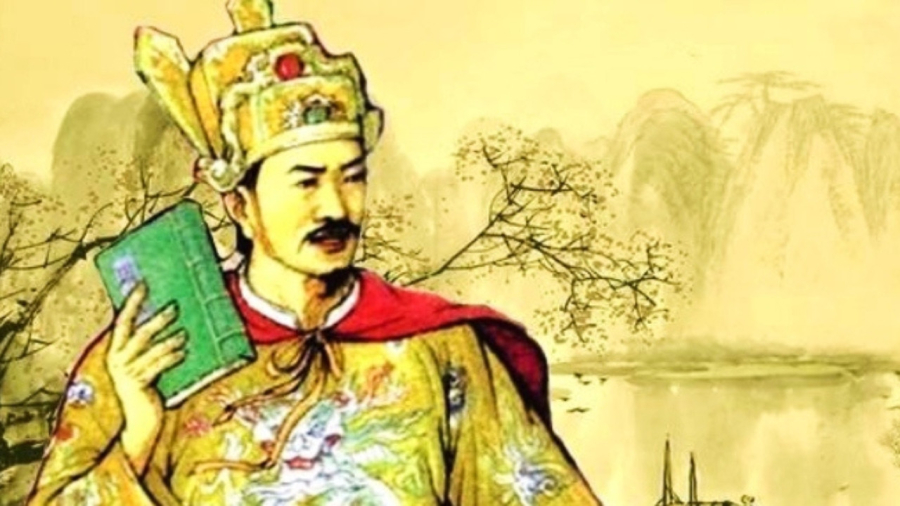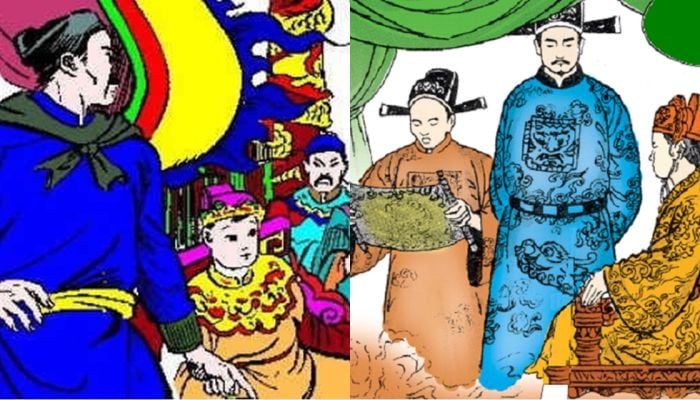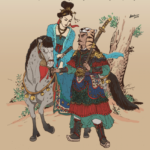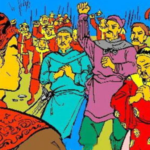People often hesitate to talk about their mistakes, especially when they hold a high position. However, in Vietnamese history, many kings have openly admitted their faults to the people. In particular, King Ly Cao Tong, with his repentance edict, is considered the first king in the feudal history of Vietnam to humbly apologize to the people.
The first king of our country to write an edict apologizing to the people
During the reign of King Ly Cao Tong, the 7th king of the Ly dynasty, the main dynasty began to decline, and the people in the country were complaining and chaos was everywhere. This is recorded by the “Dai Viet Su Ky Toan Thu”: “The king indulged in pleasure without moderation, the court was unclear, enemies were like bees, hunger and poverty followed, and the Ly dynasty’s achievements declined… Kinh Thi has a saying: Inside, mesmerized by beauty; outside, fascinated by hunting; addicted to wine and music; the palace and walls are beautiful, whoever commits one of these things will surely perish, and the king has committed all of these things, what can still be done?”.

Ly Cao Tong is the first king in the feudal history of Vietnam to humbly apologize to the people.
However, in 1207, the king saw the rampant banditry and repented, issuing an edict to acknowledge his mistakes. The book “Dai Viet Su Luoc” recorded that edict as follows: “While I was still young, I had to shoulder great responsibilities. I was in a faraway place and didn’t know the hardships of the people. I listened to the words of small-minded people and caused resentment among the lower class. If the people resent, who can I rely on? Now, I will correct my mistakes and innovate with the people. Those who have lost land and assets due to my wrongdoing will be compensated.”
However, 1207 was already the last years of his reign. In 1210, Ly Cao Tong passed away in a chaotic country, and the power of the court at that time had to rely heavily on the Tran family. These were also late and empty apologies, only made for the sake of apologizing without implementing any measures to rectify or change the situation which had become too severe to be altered.
In addition to him, there were a number of emperors who “courageously” admitted their faults to their subjects when they realized they were wrong. For example, King Le Thanh Tong once admitted his mistakes when he was straightforwardly criticized by Nguyen Ba Ky, who was a scholar and a National Scholar’s Office officer, about the king’s preference for superficial and useless learning rather than paying attention to classics and history.
Or King Quang Trung, upon receiving a “petition” from the people of Van Chuong village about the destruction of Van Mieu Thang Long and the trampling of stone steles, also candidly admitted responsibility and promised to repair them.
Which official made Ly Cao Tong observe vegetarianism and mourn after his death?

In 1210, Ly Cao Tong passed away in a chaotic country, and the power of the court at that time had to rely heavily on the Tran family.
To Hien Thanh (1102 – 1179) was a high-ranking official in the court, serving as the main assistant under two kings, Ly Anh Tong and Ly Cao Tong. After King Ly Anh Tong passed away, King Ly Cao Tong ascended the throne, and Tô Hiến Thành was appointed as the main assistant, dedicating himself to the young king. The book “Dai Viet Su Luoc” recorded that in June 1179, Tô Hiến Thành passed away, and King Ly Cao Tong mourned for 7 days in the court and observed vegetarianism for 3 days.
After Tô Hiến Thành passed away, in 1181, Long Xương, the former crown prince, led the slave subordinates to commit chaos and rob recklessly. In the following year, the queen consort used Ly Kinh Tulam as a teacher (the teacher of the king). While lecturing on books in the court, he also taught filial piety to the people, from then on, Queen Chiêu Linh and Long Xưởng did not dare to have any other evil intentions. Although Cao Tong managed to retain the throne, he did not become a wise ruler of the Ly dynasty when he grew up. In 1190, he used his sister-in-law (An Toan Nguyên Phi), named Đàm Dĩ Mông, who did not have the education to be a prime minister, so the court’s affairs deteriorated further.
On the 28th day of the month of Nhâm Ngọ, Canh Ngọ year (November 15, 1210), Cao Tong passed away at Thanh Tho palace, entrusting Đỗ Kính Tu with the affairs of the court. Cao Tong, at the age of 38, was buried at Thọ Lăng. The crown prince Ly Sảm ascended the throne, becoming King Ly Huệ Tông. The situation in the country became more chaotic, and after more than 10 years, the Ly dynasty fell into the hands of the Tran family (1225).



































